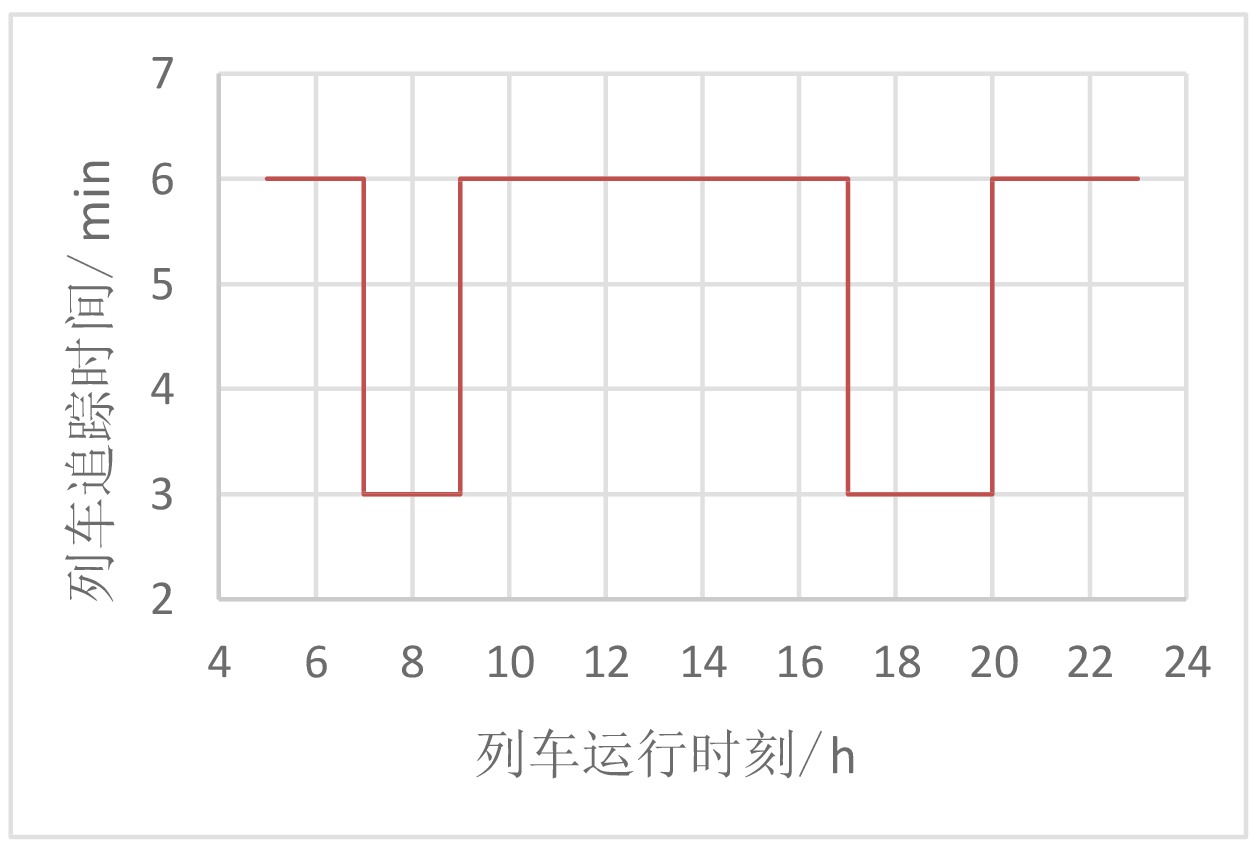One approach to adaptive headway adjustment for train autonomous circumambulation system
-
摘要: 新一代城市轨道交通信号控制系统—列车自主运行系统(TACS,Train Autonomous Circumambulation System)是基于去中心化的“车车通信”思想实现列车自主协同控制的系统,相比传统的基于通信的列车自动控制系统(CBTC,Communication Based Train Control system)更加高效、灵活和经济。为提高城市轨道交通线路运营效率,提出一种用于TACS的列车运行间隔自适应调整方法,在TACS现有技术架构上,增加客流数据分析系统,实时监测整条线路客流量,当线路出现客流高峰时,由列车自动监控系统(ATS,Automatic Train Supervision system)的列车运行调整单元重新生成列车运行时刻表,唤醒休眠列车进入运行状态来增加运力,所有在线运行列车根据最新的列车运行时刻表,交互列车运行信息,自适应调整列车运行时间间隔;通过在客流高峰时段缩短列车运行时间间隔,提高线路载客能力,在客流低峰时段延长列车运行时间间隔,降低线路运营能耗,有效提升线路的运营效率和经济性。该方案原理简单,技术上易于实现,不影响TACS现有结构和性能。
-
关键词:
- 城市轨道交通 /
- 列车自主运行系统(TACS) /
- 列车运行间隔 /
- 自适应调整 /
- 客流数据分析系统
Abstract: The new generation of train control system for urban rail transit-Train Autonomous Circuit System (TACS) is a decentralized train autonomous collaborative control system based on train-train communication. Compared to the traditional communication based Train Control System (CBTCS), it is more efficient, flexible, and economical. To improve the operating efficiency of urban rail transit lines, an adaptive train operation time interval adjustment approach for TACS is proposed. Based on the existing architecture of TACS, a passenger flow data analysis system is proposed to monitor the real-time passenger flow of the entire line. When there is a peak passenger flow on the line, the train operation adjustment unit of the Automatic Train Supervision system (ATS) regenerates the train operation schedule which will trigger the wake-up of dormant trains to enter operating mode to increase carry capacity, and all online running trains exchange train operation data with each other based on the latest train operation schedule, thus adaptively adjusting the train operation time interval. The operational efficiency and economy of the line can be effectively improved by shortening the train operation time interval during peak passenger flow periods to increase the passenger carrying capacity of the line while extending the train operation time interval during low peak passenger flow periods to reduce energy consumption of line operation. This approach has a simple principle and is technically easy to implement, without affecting the existing structure and performance of the TACS . -
铁路电子客票已于2020年6月20日在全国普速铁路推广实施[1],是客运提质的基础工程,推动客运智能发展的重要载体,以及解决旅客在票务、进站、候车、乘车、出站、换乘全过程信息化服务的必要手段。在电子客票的推行进程中,为便于旅客乘降组织的智能化发展,铁路客运部门已于2018年通过搭建人脸识别平台,支持铁路实名制进站核验系统,解决人证一致性自动检验的问题[2]。但该场景下的人脸识别技术,属于1v1模式,而刷脸出站、铁路车站内刷脸查询[3]等场景,需要研究基于1 v N模式的人像检索技术及其应用[4]。
2020年,铁路客票系统团队首次开展了基于人像检索技术的研究,铁路人像检索平台的建设主要满足车站无障碍式刷脸办理业务的需求,并实现无证件、无二维码仅通过一张“脸”知行程的功能。铁路人像检索平台上线之初,通过手动配置能够满足业务的基本需要,但随着业务场景应用范围的不断扩大,业务运维效率低下、操作流程复杂等问题日益突出,平台的流量调度模块逐渐臃肿,需要进一步优化平台的流量调度机制。
1 人像检索平台概述
平台主要应用于铁路客运场景,对终端获取的现场人脸进行人像检索,进而识别旅客身份,关联旅客车票信息,实现旅客在特定场景下的“无障碍”式出行。平台的搭建需关联多个铁路内的信息系统资源,实现人像检索算法的集成与业务逻辑的封装。
1.1 平台微服务功能
人像检索平台的软件设计采用微服务架构,基于开源的ServiceComb微服务框架[5]进行构建。平台的微服务主要包含以下几部分。
1.1.1 公共服务
公共服务包括公安服务、图片服务、配置服务等。公安服务主要通过实名制信息获取旅客的证件照;图片服务主要实现人像证件照、现场照等图片在文件系统中的增、删、查、改;配置服务针对Apollo配置中心中的配置,对其它微服务进行配置热更新。
1.1.2 基础服务
主要包括初始化、心跳、日志接收等简单的基础业务服务。初始化实现对终端设备业务开展前的鉴权认证;心跳负责监控终端设备的存活状态;日志接收实现了终端业务开展时日志向平台的实时上报,便于统计分析与故障运维等。
1.1.3 外部对接
外部对接包括管控服务、实名制消费、席位数据查询等。管控服务对开展人像检索业务的车站进行定义与维护;实名制消费用于接收电子客票推送的旅客实名制信息,并根据规则进行人像建桶;席位数据查询实现根据实名制信息查询电子客票,进而获得旅客车票信息的功能。
1.1.4 业务服务
业务服务包括人像检索、错误标注、证件类查询等。人像检索实现了在人脸桶中根据人脸现场照检索人像底库,获取对应旅客标识及车票、候车等信息的功能;错误标注用于现场旅客对人像检索结果确定非本人时,根据证件进行业务查询并响应,同时记录现场人像用于后续的算法精进;证件类查询实现在人像检索失败后,通过识读证件实名制信息,直接向电子客票集群获取旅客车票信息的功能。
1.1.5 导航服务
导航服务根据车站电报码或列车全车次信息,实现代理地址的路由与导航。为提升人像检索的检索效率,减少内部资源加载时磁盘I/O的消耗。人脸桶、人像检索算法、人像检索逻辑调用等均处于同一物理位置,因此对人脸桶创建与维护时的地址路由、人像检索业务开展时服务地址寻址等,均通过导航服务动态代理来实现。
1.2 平台技术架构
人像检索服务平台的开发,使用ServiceComb实现一整套微服务的框架。各微服务之间弱耦合,且内部以gRPC协议互联,所有微服务通过ServiceComb注册中心统一管理,通过Apollo配置中心统一配置[6],并以Docker容器化方式运行[7]。平台的技术架构,如图1所示。
(1)接入层:解析多种消息协议,实现多服务的负载均衡与统一注册管理等。
(2)服务层:通过Apollo配置中心,区分生产环境与测试环境,同时内部组建微服务集群,实现业务逻辑。内部所有业务逻辑集群,均通过导航服务进行分发。所有集群日志通过ELK进行搜集、过滤与存储,基于Kibana实现分析与展示[6],利用DingTalk进行实时告警。
(3)资源层:整合人像检索平台外部相关资源,主要包括铁路电子客票集群、铁路公安系统、人脸识别算法、管控平台及站车无线交互平台等。
1.3 人像检索平台问题描述
1.3.1 手动配置,运维难度大
人像检索平台建设初期,导航服务作为服务入口,承担着地址路由、流量分发及请求重定向等功能,其中所有的导航规则全部在Apollo配置文件中定义,该配置文件要手动进行增加、删除等维护。当车站需要开通人像检索业务时,除需在业务管控定义中进行新增车站信息以外,还需通过Apollo配置中心,手动添加该车站相关的导航信息;当车站停用人像检索业务时,又需手动删除配置中该车站的导航规则。因此,当开通人像检索业务的车站较少时,系统可勉强运维,但当需开通人像检索业务的车站较多时,配置文件会变得异常臃肿,手动运维复杂度显著提升。
1.3.2 流量负载不均衡
既有方式未能考虑车站客流量大小不同时,因流量差异而产生的服务并发不均衡问题。既有的铁路人像检索平台服务资源分配不合理,日均客流量5000人次的车站与日均客流量50000人次的车站,其对应的平台资源不应相同,不应以最高客流量的车站作为其它车站资源划分的标准,以满足并发冗余等。因此,平台的建设需要评估车站客流量的大小,实现流量的智能调度与均衡路由,合理分配系统服务资源。
2 平台流量智能调度
流量智能调度的设计摒弃既有需要手工完成导航定义的操作方式。当车站需要新开通或注销人像检索业务时,仅需修改车站管控定义,即可在平台完成车站的导航规则更新流程。在保持原有业务导航的前提下,人像检索业务中对车站导航规则的维护将更加智能,显著降低运维复杂度。
2.1 配置改造
业务应用服务运行于容器Docker中,实际业务处理均可在容器启动时指定地址与端口,因此平台所有业务的逻辑处理,都具有资源池的概念。配置改造中,不再指定具体车站的标识与应用地址,转为仅根据业务场景指定资源,实际车站的路由选择由导航服务进行处理。
例如,平台支持站内刷脸查询、刷脸出站等业务,在配置中,针对不同的业务场景,记录所有利用的资源,多个资源以逗号作为分割,形成场景地址资源池。
刷脸查询机、刷脸机器人等业务资源地址配置如下:
station.on.route.adress =IpA:porta,IpB:portb,IpC:portc
刷脸出站业务资源地址配置如下:
station.train.route.adress=IpZ:portz,IpY:porty,IpX:portx
实际导航时,先对业务场景进行分析,获取资源池中定义的相应资源,此时获取的资源暂与车站无关,再结合车站日均客流量的大小,分析如何均衡且充分的利用相关资源。
2.2 新增数据表
假设铁路各类车站中,单车站日客运量最大为12万人,对不同车站的日客流量进行分析[8],确定车站等级,便于进行人像检索业务的流量合理调度,车站日客流量预估及级别定义如表1所示。
表 1 平台车站等级定义前日客流量/万 当日预估客流量/万 车站等级 0~2 0~3 1 2~3 3~4.5 2 3~4 4.5~6 3 4~5 6~7.5 4 5~6 7.5~9 5 6~7 9~10.5 6 7+ 10.5+ 7 表1中,当日客流量的评估一般根据前日客流量放大1.5倍进行冗余考虑。车站等级划分为7个级别,随着客流量的增加,车站等级逐渐增高,等级越高,导航实现时业务寻址的权重越大,实际业务访问的请求越多,该车站每日生成的人脸底库的个数越多。据此为车站的导航记录设计导航寻址数据表,如表2所示。
表 2 新增导航记录表名称 类型 说明 station_telcode varchar 车站电报码 station_tag varchar 车站标识(on:发站,off:到站) weight Int 车站流量权重(1~7,与等级对应,等级越高,权重越大) route varchar 导航路由地址 ext1 varchar 扩展字段1 ext2 varchar 扩展字段2 ext3 varchar 扩展字段3 2.3 依托权重的调度策略
不同铁路车站的日客流量不同,在人像检索的定义中该车站的权重就不同。如图2所示,业务流量根据导航规则进行路由时,基于车站电报码获取对应的权重,并结合Apollo中的地址池对资源进行分配,将检索权重值较小的车站进行业务合并,自动做到服务资源的合理分配。
假设配置Apollo中的路由地址池未在导航记录表中用尽,则将未使用的地址直接分配给新开通人像检索业务的车站使用。若路由地址池中的所有导航地址均已在导航记录表中使用,导航服务则根据传入的车站电报码,评估该车站的权重等级。根据权重等级,计算路由地址之间的权重总和,并取权重之和最小的地址作为此次导航地址进行分配,如果导航地址的权重之和相同,随机选取一个地址作为路由地址进行导航。
2.4 流量调度案例分析
假设Apollo中的业务资源地址配置为:
station.on.route.adress =IpA:porta,IpB:portb,Ipc:portc
导航服务会根据导航记录表中的数据,计算每个导航地址下分配的车站码权重之和,例如:
IpA:porta下已经分配的车站电报码列表为[QIP,VAP],权重级别分别为2、3,即IpA:porta的权重总和为5;
IpB:portb下已经分配的车站电报码列表为[QBP,VJP],权重级别分别为4、5,即IpB:portb的权重总和为9;
Ipc:portc下已经分配的车站电报码列表为[BXP,IZP,BJP],权重级别分别为2、1、6,即Ipc:portc的权重总和为9。
此时权重之和最小为5的地址为IpA:porta,导航服务会将其分配给新开通人像检索业务的车站电报码,并进行业务导航。
3 结束语
本文通过对车站的日客流量进行预测,定义车站等级,进而形成权重,通过权重均衡路由地址池中资源,并分配给相关车站,构建铁路人像检索平台智能流量调度,保障了平台的流量分发与路由地址管理,降低了运维复杂度,显著提升了平台的研发与运维效率。目前,虽已实现平台的流量智能分配,但仍存在一些不足,导航后置的业务处理服务若出现故障,仍需对调度信息进行手动修改,尚未能实现故障自愈机制,未来研究需在满足业务智能化发展的同时,进一步提升系统建设的鲁棒性。
-
[1] 王卓然,贾学祥. 我国城市轨道交通信号系统的发展方向[J]. 交通世界,2019(12):158-159. [2] 王潇骁. 城市轨道交通运能提升策略研究[J]. 城市轨道交通研究,2021,24(9):69-72. [3] 向 宫. 列车自主运行系统(TACS)[J]. 智慧中国,2022(5):72-73. [4] 中国国家铁路集团有限公司. 韩国铁道研究院开展列车自动控制系统研究[EB/OL]. [2021-09-30]. https://www.china-railway.com.cn/gjhz/sjtldt/202110/t20211009_117383.html. [5] 林 鸿,王林美,魏艳萍. 关于欧盟Shift2Rail计划的研究[J]. 国外铁道车辆,2019,56(1):11-16. [6] DOCPLAYER. URBALIS Fluence ALSTOM. Enhanced CBTC solution[EB/OL]. [2017]. https://docplayer.net/50149107-Urbalis-fluence-alstom-enhanced-cbtc-solution.html.
[7] 轨道世界. 无感改造再进一步:车车通信列控系统及自主感知运行系统获颁SIL4级证书[EB/OL]. [2021-12-22]. https://t.cj.sina.com.cn/articles/view/1002429827/3bbfdd83019012ush. [8] 卡斯柯信号有限公司. 启骥®TACS—为列车自主运行提供新的解决方案[J]. 城市轨道交通研究,2022,25(11):93. [9] 青岛市情网. 国内地铁首辆最智能TACS系统列车在青亮相[EB/OL]. [2023-04-01]. https://epaper.qingdaonews.com/qdrb/html/2023-04/01/content_18543_7515979.htm. [10] 罗情平,吴 昊,陈丽君. 基于车−车通信的列车自主运行系统研究[J]. 城市轨道交通研究,2018,21(7):46-49. DOI: 10.16037/j.1007-869x.2018.07.012 [11] 陈尔超. 车车通信在轨道交通信号改造中的应用研究[J]. 交通科技与管理,2022(7):17-19. -
期刊类型引用(1)
1. 吕占民,李士达,戴琳琳,宋春晓,董兴芝. 基于AR智能眼镜的免打扰列车验票应用研究. 铁路计算机应用. 2023(05): 64-67 .  本站查看
本站查看
其他类型引用(0)





 下载:
下载:






